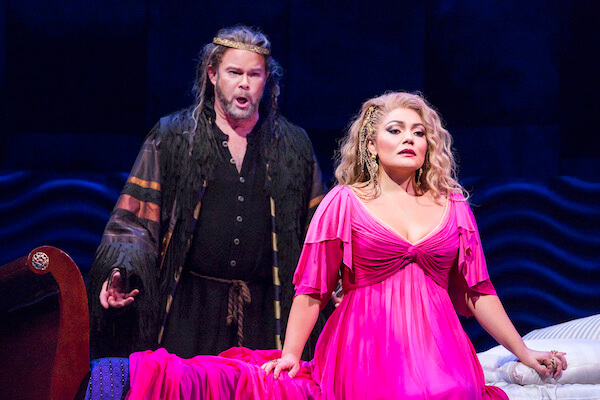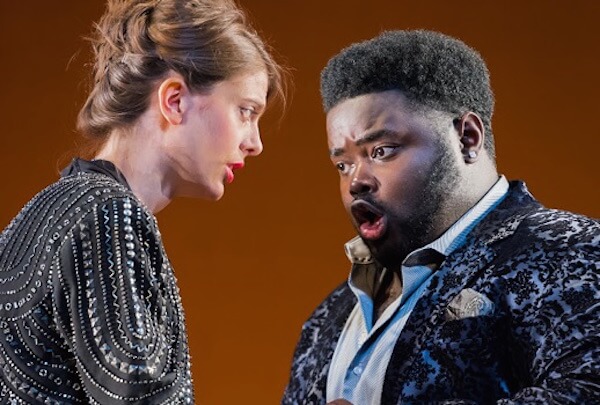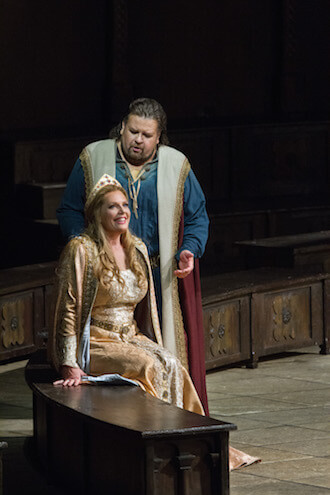Matthias Goerne in the title role of Berg's “Wozzeck” at the Metropolitan Opera.| MARTY SOHL/ METROPOLITAN OPERA
As part of Carnegie Hall’s three-week “Vienna: City of Dreams” festival, the Vienna State Opera performed in concert two 20th century operas dealing with abnormal psychology. Richard Strauss’ “Salome” (1905) and Alban Berg’s “Wozzeck” (1925) were composed during the same period as Sigmund Freud’s pioneering studies of psychoanalysis, though their literary sources — Wilde and Büchner — predated Freud. Only a few days later, the Metropolitan Opera revived “Wozzeck” fully staged with several surprising role debuts.
On March 1, “Salome” was given an exciting reading by the newly appointed music director of the Boston Symphony — rising podium star Andris Nelsons. Though his Met appearances have failed to impress me, Nelsons kept the Vienna Philharmonic at a constant boil — the silken string section surging over churning brass and slicing woodwinds.
Carnegie Hall features in concert “Salome,” “Wozzeck,” also revived at Met
The two main antagonists were sung by interesting newcomers. Gun-Brit Barkmin in the title role was dramatically volatile, energetic, and imperious. Barkmin has a lean tensile medium weight soprano with a pithy middle voice and expansive upper register. Not a voice for the ages but accurate, effective and expressive. Done up as a silent movie vamp with jeweled headband, Louise Brooks bob, and brocade kimono, she played Salome as a knowing, willful seductress. Though I prefer the polymorphous perverse, corrupted innocent approach, Barkmin’s vivid delivery of the text and confident manner gave her Judean princess vibrant theatricality even in a concert setting.
As Jochanaan, Tomas Koniezcny stepped in for Falk Struckmann, displaying a juicy youthful baritone full of energy and volume. Subtlety and authority are yet to come.
Gerhard Siegel’s sturdy-toned Herod was amusingly high-strung and garrulous. Jane Henschel as Herodias exuded gleeful venom capped by still puissant high notes.
The previous evening, Franz Welser-Möst led the Vienna Philharmonic in “Wozzeck.” Welser-Möst and the orchestra’s shining, burnished strings made Berg’s twelve-tone score sound like a late Mahler symphony. Aiming for broad, sweeping musical arcs, Welser-Möst’s symphonic approach smoothed over the score’s astringent atonal edges, bringing Berg’s opera more in line with late Strauss and Franz Schreker.
Matthias Goerne and Evelyn Herlitzius made rare US operatic appearances as the doomed Wozzeck and Marie. Goerne sang with handsome resonance and lieder-like attention to text but seemed dramatically recessive, Wozzeck’s increasing mania and desperation failing to register.
Herlitzius proved a force of nature — her petite frame unleashing surprisingly powerful waves of steely sound. She delivered Isolde-like power at the high climaxes The tone itself is metallic, lacking richness but was surprisingly steady and wobble-free on this occasion. Herlitzius’ face and body exuded total immersion in the music and drama even before she emitted a sound.
Herbert Lippert’s light refined tenor was badly miscast as the Drum Major while Herwig Pecoraro and Wolfgang Bankl as the Captain and Doctor sang musically but without the requisite grotesquerie. Except for the fiercely committed Herlitzius, theatricality was lacking in this musically refined reading.
On March 6, Goerne replaced the ailing Thomas Hampson as Wozzeck at the season premiere of the Metropolitan, Opera revival on less than 48 hours’ notice. After only a few brief rehearsals and having performed “Die schöne Müllerin” at Carnegie Hall the prior evening, Goerne took complete possession of the role.
In James Levine’s interpretation of one of his signature works, musical refinement and theatrical expression go hand in hand. Levine understands each nuance of the score, relishing both the spiky ugliness and the fleeting, shattering moments of beauty.
Deborah Voigt in a role debut created a warm, fallible, but movingly human Marie — a poor, struggling woman desperate for any kind of simple joy in her downtrodden existence. Voigt had a wonderful rapport with Anthony Reznikovsky as her child — alternately impatiently neglectful and then playfully affectionate or warmly maternal. Her patchwork of a soprano suited the character and the vocal writing. Powerful metallic tops ignited exciting confrontation scenes and the worn, sour tone lower down suggested Marie’s soul weariness in sung speech passages. This is likely Voigt’s last Met appearance in a major operatic role — she can be proud of this achievement.
Simon O’Neill’s bright, ringing tones suggested the Drum Major’s vulgarity without coarse vocalism. Peter Hoare was a fiercely manic Captain, while bass Clive Bayley debuted as a fascinatingly sinister and effete Doctor. Tamara Mumford was an earthily sensual Margret, and Russell Thomas a lyrically robust Andres.
The Mark Lamos production, indebted to German Expressionist cinema of the 1920s and ‘30s remains effective, if hardly cutting edge.
Goerne and Hampson (seen March 17) provided strikingly contrasting interpretations. Goerne cut a very proletarian figure with bulging eyes, stocky frame, and oddly asymmetrical features in a round peasant face. His soldier suffered from mental illness from the very beginning — alienated from his brutal surroundings and lost in his own paranoid universe. He physically degenerated before our eyes — increasingly disheveled and shambling in his gait. Goerne’s singing mixed the verbal subtlety of a lieder singer with striking moments of power and occasional roughness — all appropriate.
The tall, distinguished, intellectual Hampson played effectively against type — stooping his shoulders, graying his hair, and speaking in halting accents with the sad eyes of a beaten dog. His Wozzeck was driven to madness and murder by societal and personal pressures — a tragic figure fighting external demons rather than those within. Traces of lingering bronchitis likely account for Hampson’s gray, barking tone and hollow shouted high notes. I felt that Hampson was working from the brain while Goerne lived Wozzeck from deep within his heart, soul, and mind. A revival that looked questionable on paper proved one of the season’s best offerings.



































